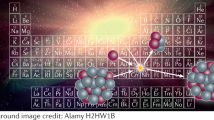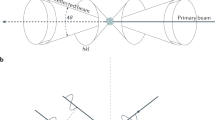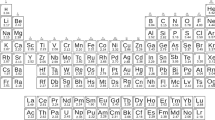Abstract
IT is just a hundred years ago that the atomic weight of zirconium was determined by Berzelius. The method used, namely the analysis of the sulphate, yielded too low a value for the atomic weight, the same being the case in all the different methods used by his followers. This error was compensated, however, in part by the presence of 0.5 to 2 per cent. of a heavy element (hafnium) in their preparations (see NATURE, March 15, 1924). It was only in 1917 that Venable and Bell, when analysing ZrCl4, used a more trustworthy method originating from T. W. Richards's laboratory. The values found by these investigators were appreciably higher than those found by their predecessors, and showed at the same time fluctuations for the values of the atomic weight, greater than should be expected considering the extreme precautions taken and the reliability of the method used.
This is a preview of subscription content, access via your institution
Access options
Subscribe to this journal
Receive 51 print issues and online access
$199.00 per year
only $3.90 per issue
Buy this article
- Purchase on Springer Link
- Instant access to full article PDF
Prices may be subject to local taxes which are calculated during checkout
Similar content being viewed by others
Author information
Authors and Affiliations
Rights and permissions
About this article
Cite this article
HEVESY, G. The Atomic Weights of Zirconium and Hafnium. Nature 115, 335–336 (1925). https://doi.org/10.1038/115335a0
Issue Date:
DOI: https://doi.org/10.1038/115335a0
Comments
By submitting a comment you agree to abide by our Terms and Community Guidelines. If you find something abusive or that does not comply with our terms or guidelines please flag it as inappropriate.



